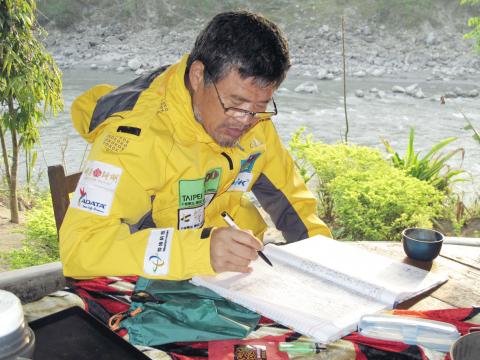Taiwanese mountaineer Lee Hsiao-shih (李小石), who was known for always carrying a statue of Matsu, goddess of the sea, on his expeditions, was confirmed dead yesterday after conquering the fourth-highest mountain on the planet. He was 58.
Lee left for Mount Lhotse, or “South Peak” in Tibetan, on the border between Tibet and Nepal on April 8, along with companions Lin Chuan-ming (林泉銘) and former Chiayi County Health Department deputy director Lu Han-yueh (呂漢岳). They arrived at the mountain’s camp base on April 19.
Lu returned to Taiwan on April 28 after experiencing violent bouts of coughing.

Photo: Tsai Tsung-hsun, Taipei Times
Meanwhile, Lin went on an expedition to the Island Peak Summit, which has elevation of 6,189m, while Lee continued toward the main summit of Lhotse — 8,516m above the sea level — accompanied by Sherpa guides.
Lee reached the main peak of Lhotse on Friday last week. However, he fainted while descending from the mountain after coping with inclement weather along the way.
Lee’s wife, Lin Ching-ching (林青青), was told by the mountaineering firm that helped to arrange the trip that Lee had passed away on Sunday, but Lu later discovered that Lee’s wife was misinformed.
After Lee was reported to have improved after receiving treatment, Lin Ching-ching decided to meet with Lu in Greater Kaohsiung and the two were scheduled to leave for Nepal via Hong Kong yesterday.
However, she received a telephone call from Lin Chuan-ming soon after she boarded the High Speed Rail, saying that Lee had been found dead yesterday morning at the base camp.
Lin Ching-ching then decided to return home to Chiayi County and discuss with other family details for Lee’s burial.
Lee’s wife told reporters that her husband wanted to be buried in the mountains if he died on an expedition.
Lee, a native of Lienchiang County (Matsu) was a calligrapher, painter and photographer. He climbed Mount Everest in 2009 and published a book in 2010 detailing his expedition on the highest mountain on Earth.
In 2011, he reached the top of Mount Manaslu, the eighth-highest mountain in the world.
The mountaineer once said that his whole family became firm believers in Matsu after his father was rescued four days after a ship he was traveling on capsized in rough waters.
Following that, he pledged to take a statue of Matsu with him while climbing the world’s 14 highest peaks.
The Lienchiang County Government announced that the county would hold a memorial service in commemoration of Lee’s achievements.
“Matsu was proud of Lee Hsiao-shih, and the stories of him carrying the statue of the goddess Matsu on his expeditions in the mountains will forever be told in his hometown,” county officials said.

A year-long renovation of Taipei’s Bangka Park (艋舺公園) began yesterday, as city workers fenced off the site and cleared out belongings left by homeless residents who had been living there. Despite protests from displaced residents, a city official defended the government’s relocation efforts, saying transitional housing has been offered. The renovation of the park in Taipei’s Wanhua District (萬華), near Longshan Temple (龍山寺), began at 9am yesterday, as about 20 homeless people packed their belongings and left after being asked to move by city personnel. Among them was a 90-year-old woman surnamed Wang (王), who last week said that she had no plans

TO BE APPEALED: The environment ministry said coal reduction goals had to be reached within two months, which was against the principle of legitimate expectation The Taipei High Administrative Court on Thursday ruled in favor of the Taichung Environmental Protection Bureau in its administrative litigation against the Ministry of Environment for the rescission of a NT$18 million fine (US$609,570) imposed by the bureau on the Taichung Power Plant in 2019 for alleged excess coal power generation. The bureau in November 2019 revised what it said was a “slip of the pen” in the text of the operating permit granted to the plant — which is run by Taiwan Power Co (Taipower) — in October 2017. The permit originally read: “reduce coal use by 40 percent from Jan.

China might accelerate its strategic actions toward Taiwan, the South China Sea and across the first island chain, after the US officially entered a military conflict with Iran, as Beijing would perceive Washington as incapable of fighting a two-front war, a military expert said yesterday. The US’ ongoing conflict with Iran is not merely an act of retaliation or a “delaying tactic,” but a strategic military campaign aimed at dismantling Tehran’s nuclear capabilities and reshaping the regional order in the Middle East, said National Defense University distinguished adjunct lecturer Holmes Liao (廖宏祥), former McDonnell Douglas Aerospace representative in Taiwan. If

‘SPEY’ REACTION: Beijing said its Eastern Theater Command ‘organized troops to monitor and guard the entire process’ of a Taiwan Strait transit China sent 74 warplanes toward Taiwan between late Thursday and early yesterday, 61 of which crossed the median line in the Taiwan Strait. It was not clear why so many planes were scrambled, said the Ministry of National Defense, which tabulated the flights. The aircraft were sent in two separate tranches, the ministry said. The Ministry of Foreign Affairs on Thursday “confirmed and welcomed” a transit by the British Royal Navy’s HMS Spey, a River-class offshore patrol vessel, through the Taiwan Strait a day earlier. The ship’s transit “once again [reaffirmed the Strait’s] status as international waters,” the foreign ministry said. “Such transits by